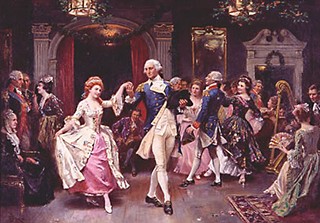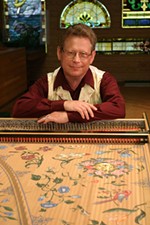Yankee Baroque
La Follia expanded our sense of our country's founders through the music they heard and sang
Reviewed by Robert Faires, Fri., July 6, 2012
Yankee Baroque
First Presbyterian Church, 8001 MesaJune 30
Keith Womer walked out for La Follia's concert of early American music wearing his enthusiasm for the material on his, well, not sleeve, exactly – more like shirtfront. Cascading down the black fabric was a festive tie of red and white stripes above a star-spangled field of blue. This bit of unconventional concert wardrobe was, like the deeds of the Founding Fathers themselves, an act of rebellion against the Old World establishment. Down with Europe's stuffy black-tie formality! Up with America's rousing red, white, and blue!
Indeed, the whole program was in the spirit of the Spirit of '76: breaking from the ensemble's traditional focus on the baroque music of Europe to explore music made in the American colonies during Revolutionary times – specifically, 1751-81. Womer drew from a broad range of material heard in the day, everything from hymns to drinking songs, love ballads to military marches, country dances to minuets. None of it will displace the work of Vivaldi, Handel, or J.S. Bach at the summit of baroque musical achievement, but that wasn't the point. Womer's musical hodgepodge was intended to give us a sense of the era and of the men we revere so for leading us through it.
And so it did, walking us through tunes that Samuel Adams might have sung on Sundays in a Boston church (including some by William Billings, a pioneering American composer who should be better known), music by Corelli that Jefferson likely played on his own violin (performed splendidly here with lightning-flash bowing and vigor by Bruce Colson), toasts to which Franklin caroused in Paris, laments of love and anthems of war that Washington likely heard his soldiers sing (the former most richly represented here by the folk ballad "Katy Cruel" – brought to vivacious life by mezzo soprano Lisa Alexander and three women – and the latter by Andrew Law's chilling "Bunker Hill"), and even a homegrown oratorio wherein the goddess Minerva prophesies a shiny future for the newly independent America (albeit to music by English composers Arne and Handel!). With expert musicianship to match Womer's keenness (notably Jeffrey Jones-Ragona's masterly vocal direction), Yankee Baroque provided fresh insight into our nation's founders, adding dimension to them through the soundtrack of their struggles. It was like a live mix-tape made for Washington at war's end, replaying the Revolution and all its feelings through the music of the times. No doubt it would've made Washington dance.













